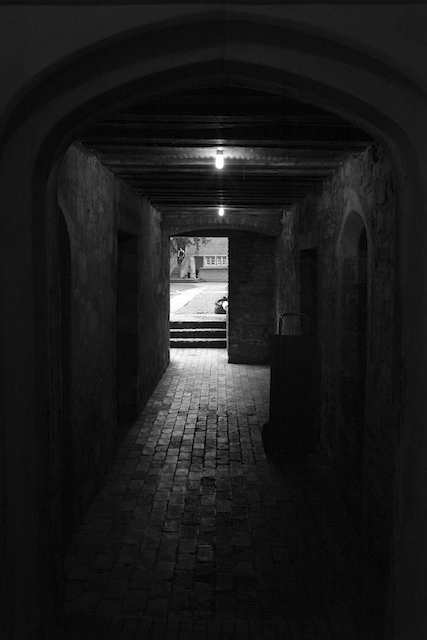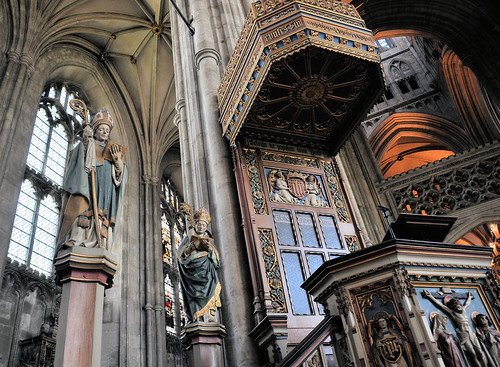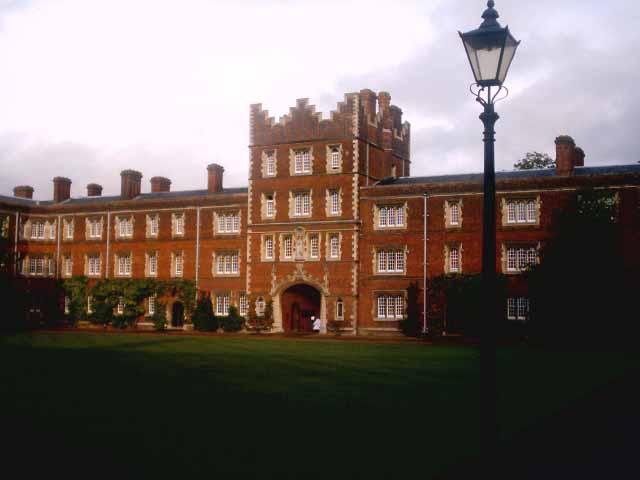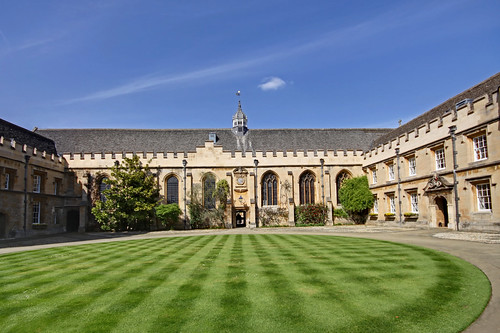Doctor John Richardson was born in Linton, Cambridgeshire seven miles from Cambridge. Like most of the KJV translators he was youngish or of middle-age and came from one of the regions of London, Oxford and Cambridge. The translators were not a cross section of English people or English clergy but of the scholars who happened to be on hand for the venture. The restricted geographical source was inevitable for two reasons (1) Universities were located only in the two communities of Oxford and Cambridge; (2) Extreme difficulties (compared to today) in communication and travel made it expedient to hold the committee sessions in the three main centres of London , Oxford and Cambridge. London University was founded by Royal Charter in 1836 over two hundred years later.
Academic appointments
John Richardson matriculated as a sizar from Clare College, Cambridge in 1578, obtained an MA in 1585. Further studies in divinity led to a BTh in 1592, and DTh in 1597. He became a fellow of Emmanuel College. In 1607 he succeeded John Overall as Regius Professor of Divinity. He was Master of Peterhouse (1608 - 1615), and then appointed Master of Trinity College, Cambridge (1615), and serving for two years as Vice-Chancellor of the University.(1617 - 1618).
Trinity College Chapel, Cambridge.
flickr.com
Linguistic Ability
He was noted, says McClure, as
"a most excellent linguist," as every good theologian must be; for, as Coleridge says, "language is the armory of the human mind; and at once contains the trophies of its past, and the weapons of its future conquests.
Not only a fine Hebraist, Richardson’s Latin was skillfully honed, shown by some Latin verses he contributed to
Michael Dalton's The Countrey Justice (1618).
One day King James 1 was entertained at Cambridge by an intellectual joust:
In those days, it was the custom, at seats of learning, for the ablest men to hold public disputes, in the Latin tongue, with a view to display their skill in the weapons of logic, and "the dialectic fence." As the ancient knights delighted to display and exercise their skill and strength in running at tilt, and amicably breaking spears with one another; so the great scholars used to cope with each other in the arena of public argument, and strive for literary "masteries." Those scholastic tournaments were sure to be got up whenever the halls of science were visited by the king, or some chief magnate of the land; and the logical conflicts, always conducted in the Latin tongue, were attended with as much absorbing interest as were the shows of gladiators among the Romans. McClure
Rodin's thinker
flickr.com
A Dr. John Davenant (later Bishop of Salisbury) was defending the view - against all-comers - that the Church had no right to excommunicate a King. This contest had in mind the Pope's excommunication of Henry VIII in 1533 and of Elizabeth I in 1570, and the desire of James 1 to establish the Stuart dynasty on rock-solid foundations. However, Richardson trumped Davenant in the wordy war by alluding to the example of Ambrose, Bishop of Milan, a man of outstanding merit and acknowledged saintliness. Ambrose excommunicated the emperor Theodosius in 390 AD
flickr.com
"Here was a poser! King James, who was always very nervous on the subject of regal prerogative, saw that his champion was staggering under that stunning fact; and, to save him, cried out in a passion,-- Profecto fuit hoc ab Ambrosio insolentissime factum. [“Verily, this was a great piece of insolence on the part of Ambrose!"] To this, Dr. Richardson calmly rejoined,-- Responsum vere regium, et Alexandro dignum; hoc est non argumenta dissolvere, sed desecare. [“A truly royal response, and worthy of Alexander! “This is cutting our knotty arguments, instead of untying them."] And so taking his seat, he desisted from further discussion." McClure
King James I
flickr.com
Here was a subject remonstrating with his King yet, while holding his own, still showing the humility of a spirit submissive to lawful authority.
Contribution to the KJV translation
Richardson as a skilled linguist served in the first Cambridge Company, appointed by King James I with the translation of the Old Testament books, from Chronicles to Song of Songs. Their love of balanced lines in free-verse couplets is shown in the way they rendered the Psalms, conspicuously improving on the Geneva Bible. This Cambridge Group had a masterly poetic touch with English words and sounds, and it is well illustrated in the lush and concrete love-poems of the Song of Songs. Balanced lines and free verse couplets - these rendered the parallelism of, for example, Psalms 23 and 121. More lyrical than:
Doubtless kindness and mercy shall follow me all the days of my life, And I shall remain a long season in the house of the Lord.
You can surely recite the KJV by heart? Whereas the Geneva Bible rendered Psalm 121 as:
I will lift mine eyes unto the mountains, From whence my help shall come,
the rhythm of the KJV improves it:
I will lift up mine eyes unto the hills, From whence cometh my help.
Theological concerns
Richardson attracted some obloquy as one of the first Cambridge theologians to take up an Arminian position, and he was a popular theologian. The Puritans called him “a fat-bellied Arminian.” However, there’s no evidence he got into cantankerous debate with such men as Laurence Chaderton (of Emmanuel). Rather, he seems to have been well liked by his peers. Nicolson has him “increasingly ceremonialist and fat.”
Richardson shared an Arminian view of salvation with John Bois and John Overall, Richard Thompson and many of the translators, over against the Calvinistic convictions of such scholars as Samuel Ward, Laurence Chaderton, and George Abbot. (1)
Last days
John Richardson died in Cambridge in 1625 and was buried in Trinity College chapel. Emmanuel and Peterhouse were beneficiaries of his will.
(1) Payne, Gustavus, (1959/1977)
The men behind the King James version, MI: Bakerpp. Pp. 56-58, 141
This is 29/52
Previous Next
Index



 's
's







